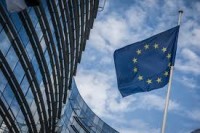 The European parliament’s environment committee voted for the increased recycling target.
The European parliament’s environment committee voted for the increased recycling target.
Let’s Recycle reported on the vote “in favour” of the amendment to the circular economy package, which will see the recycling target for EU states increase to 70 percent by 2030. The amendment was filed by Italian MEP Simona Bonafè, and alongside other adopted amendments “will be discussed more widely by MEPs at a plenary session” in March, but will “need backing of European ministers before they can be adopted into EU law”.
The original target was proposed in December 2015, and was 65 percent, MEPs arguing that the recent amendment would help to “accelerate the switch to a circular economy”. Other amendments voted through included “inclusion of a requirement for separate collection of bio-waste, textiles and wood to be made mandatory”, as well as the wording of text relating to the “final recycling process”, which the site says is “likely to be important to the point at which material can be considered ‘recycled’”.
Originally, the process was defined by the EU as the process “which begins when no further mechanical sorting operation is needed and waste materials enter a production process and are effectively reprocessed into products, materials or substances”. Now, the amended process is defined as one “which begins when no further sorting operation is needed and waste materials are effectively reprocessed into products, materials or substances”.
Let’s Recycle noted that despite the UK’s decision to leave the EU last year, “it is now anticipated that any circular economy legislation agreed by Europe will be adopted into UK law”, with officials from the UK’s Department for Environment, Food and Rural Affairs (Defra) stating that “the UK will opt to adhere to the proposals that are eventually agreed in the package after Brexit, although it remains to be seen how the UK will approach a higher recycling target”.
Defra Minister Thérèse Coffey stated in regards to the circular economy that “while we are members of the European Union we will negotiate in good faith”, and that “I am approaching the negotiations on the eventual outcome for the circular economy in a way consistent with that”. On timing, she added that “it is likely that we will still be in the [EU], which will mean that we are required by directive to introduce it into law, but we are approaching the matter in good faith while negotiating quite hard on behalf of the United Kingdom and what we think is achievable and realistic”.
The European Recycling Platform (ERP) also commented on the EU decision, and stated that “harmonised rules, competition and a level playing field are key for effective extended producer responsibility (EPR) in Europe”. It added that it “welcomes” the new target, and sees it as an “important step towards a clear and harmonised legal framework” for ERP in the EU.
It added that EPR “is a key instrument” for the circualar economy”, with producer responsibility organisations (PROs) able to “establish a level playing field” in a “flexible and competitive environment”, calling on the EU and member states to “keep a high level of ambition in the course of the legislative process in order to guarantee good governance and fair competition for EPR schemes”.
Umberto Raiteri, ERP President and CEO, commented: “Thanks to our operational experience across member states we have a good overview of which political instruments are suitable to maximise benefits for both the consumer and the environment. With yesterday’s vote for harmonisation and fair competition, the MEPs have taken an important step forward towards a regulatory framework that will help reducing free-riding in waste management and increase the volume of product waste collected and recycled.”
